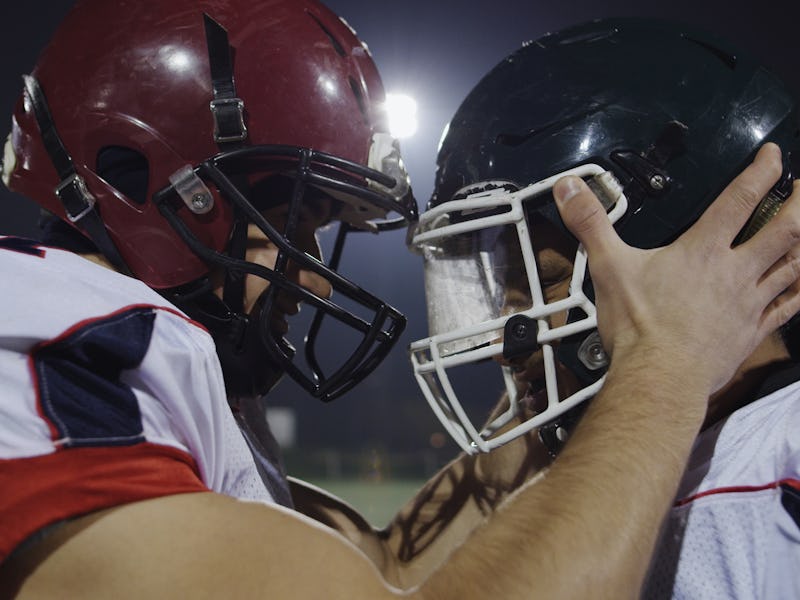Football concussions have a devastating sexual health outcome — studies
The more you get hit in the head, the worse the results are, the research suggests.

As you savor the Buffalo chicken wings, watch the ads, and marvel at J.Lo and Shakira's half-time show, new research presents a sobering truth about the health of the football players who make the Super Bowl the spectacle Americans know and love.
Scientists know that repeated hits to the head — the kind footballers endure all game long — can lead to concussion and permanent brain injury. A 2017 study of the brains of deceased football players revealed that 99 percent of their brains had signs of the progressive degenerative disease chronic traumatic encephalopathy.
But beyond brain injury, repeated concussions may have another surprising health consequence — erectile dysfunction.
In an August 2019 study published in JAMA Neurology, researchers show that former football players who experienced multiple head injuries while on the field were more likely to need medication for erectile dysfunction or low testosterone in later life.
"Our research points to a hormonal cascade that may be set off by injury to the brain," Harvard University professor and lead researcher Rachel Grashow tells Inverse.
The research stems from an ongoing study involving 3,400 participants, all of whom were at one point seasoned NFL players. Most of the participants are now in their early fifties, but the study included men as young as 24 and as old as 89. On average, they had each played the game for around seven seasons. The players responded to a survey to measure how frequently they experienced concussion symptoms after a hit to the head. They were then grouped by whether they had very low, low, mild, or severe numbers of concussions. The researchers also noted whether a doctor or clinician had prescribed or recommended they take medication for erectile dysfunction or testosterone levels at any point.
Overall, the players with the most-severe concussion symptoms were twice as likely to experience erectile dysfunction than those with the least-severe symptoms.
"I was surprised by the strength of the association between concussion symptoms and erectile dysfunction and low testosterone: it persisted even when we controlled for the other factors that may lead someone to experience ED [erectile dysfunction] or low testosterone." Grashow says.
Linking the brain, footballers, and sexual health
The research is part of a bigger effort at the university to study the health risks and benefits associated with playing American football.
The Football Players' Health study involves studying “the whole player, and the player’s whole life,” Grashow said during an interview with JAMA Network Learning.
“We wanted to look at aspects of sexual health within that framework because we know it impacts quality of life,” Grashow said.
“This seemed like a really good opportunity to dig in and figure out whether we saw the same, or similar, relationships with ED and pituitary dysfunction in a large group of elite athletes who had multiple head injuries,” she said.
The new research backs up previous findings. Smaller studies of professional athletes, and larger samples of non-athletes, suggest that brain injury can lead to both erectile dysfunction and problems with the pituitary gland — the part of the brain that controls testosterone.
Another 2018 study conducted in Taiwan also suggests that a single traumatic brain injury is associated with erectile dysfunction.
But how exactly does getting hit cause a hormone imbalance?
The pituitary gland may be the key, Grashow says. This "master gland" is connected to the rest of the brain with delicate tissue, containing flood vessels and neurons. Hits to the head can chip away at that connection.
"This gland is particularly vulnerable to mechanical trauma because of its location and structure," she says.
When players are hit in the head, blood flow to the gland can be interrupted or the neuronal connections disrupted. That ends up “starving” the pituitary gland of its blood supply, impairing its communication with the rest of the brain.
Potential remedies
On the field, players in certain positions are more likely to get injured — and it is possible that changes to tackling may result in fewer concussions. But some experts don't think that is enough to safeguard footballers' health, especially given the high rates of concussions among teenagers and their particular vulnerability to brain damage.
The research may cast a shadow on a beloved American sport, but highlighting these issues can lead to better outcomes for current, former, and future football players, researchers say. That includes discussing issues like sexual function in men, which tends to carry stigma.
“The stigma around this topic is very strong, and we were concerned that there would be underreporting,” Grashow said.
The research does suffer from a few confounds. A player who experienced more head hits might have had other injuries that cause lasting physical pain, for example. In that case, a player might be prescribed opiate painkillers, which are also associated with erectile problems.
"Ours was a gateway study so more work is needed, but it is clear that something is happening, and future research should focus on elucidating key biological mechanisms," Grashow says.
Ultimately, former players — or anyone — who is struggling with erectile function or testosterone levels should seek medical help, Grashow says.
"I am continually moved by the resilience, strength and focus of active and former players of professional football. They are formidable athletes, and it is immensely gratifying for me to know that our research may play a role in helping protect and improve players’ health and quality of life," she says.